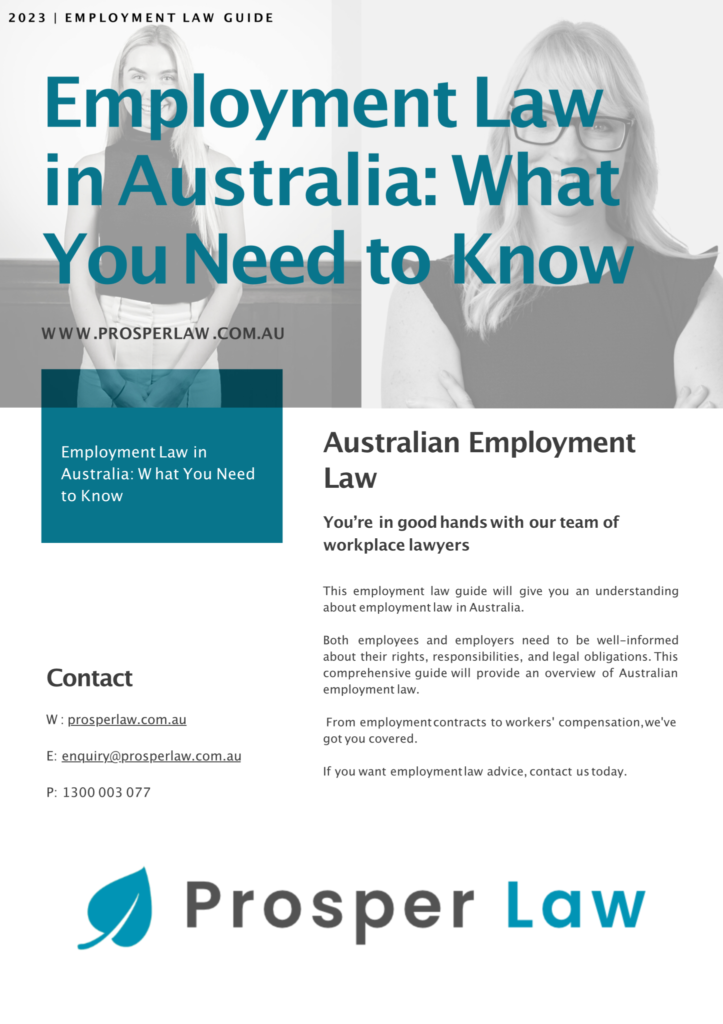Modern Awards have been an integral part of the Australian workplace relations system since its introduction in January 2010. Many employers and employees say they don’t understand Modern Awards or how they are applied. A lack of understanding of Modern Awards can have serious consequences.
This article explains what a modern award means and what else an employer or employee should know.
Australia has a highly regulated employment system with a complex framework of requirements that vary by occupation and industry and, in some respects, by State and Territory.
The Fair Work Commission makes Modern Awards, which are quasi-statutory instruments. Modern Awards set out a range of minimum employment conditions for specific industries and occupations that are equivalent to or more generous than the national employment standards (also known as NES).
Modern Awards cover matters such as:
- hours of work and rosters
- meal and rest breaks
- overtime
- penalties for night and weekend work
These awards operate similarly to legislation, and their application can only be circumvented in limited circumstances. There are currently 122 awards, and almost all businesses in Australia will employ award covered employees.
Modern Awards are usually discussed in the context of employee pay, perhaps because this is the issue most likely to lead to Court cases. Modern Awards, however, can and often do cover a more comprehensive range of employment-related matters. For example, anything having to do with an employee’s hours of work is likely to be covered by a Modern Award. This can include everything from minimum rest periods to minimum notice periods.
Awards may also establish a legal framework for employer-employee relations. For example, they may set out rules for consultation prior to changes in the workplace and mechanisms for dispute resolution.
When does a Modern Award apply?
Modern Awards apply to employees depending on the industry or job. Each award contains important information about who it applies to and how the job is classified. Modern Awards may apply to all workers covered by the national labour relations system.
Modern Awards apply by law, not by choice. Modern Award entitlements are in addition to the ten basic entitlements set out in the National Employment Standards. If an employee is covered by a Modern award, you cannot “choose” not to comply with the Award – the Award applies both legally and factually, regardless of whether the employer or the employee chooses to apply the Award.
Only a judge can tell you which award applies. The Fair Work Ombudsman (FWO) – responsible for investigating employers for award entitlements – is not in a position to say definitively which award applies to a particular employee. They can only give you “general advice,” or you can seek advice from an employment contract lawyer.
It is a good idea to ask the Ombudsman to provide his “general advice” in writing for future reference. However, nothing can protect employers from future claims caused by applying an incorrect award.
There is a misconception among employers that if they pay an employee a basic rate of pay that is higher than the minimum rate in an applicable modern award, the award does not apply. They are mistaken, it does apply!
Take, for example, the case of Muscat v Chase Commercial Pty Limited T/A Chase Commercials [2018] FWC 1398 (March 29, 2018). The FWC held that the Director of asset management of a real estate agency was covered by the Real Estate Industry Award 2010 despite her title and a salary of $180,000. The FWC found that the employee performed functions that were covered by the Real Estate Industry Award and were not excluded from the scope of the award solely because of her title and above-Award remuneration.
Unless the contract of employment makes it clear which modern award entitlements are included in the ‘over award’ rate of pay, then it is more than likely that the higher rate will simply be treated as the ‘base rate” upon which all of the loadings, penalties and allowances in the award must then be calculated. In this case, the employee will benefit from both a higher base rate of pay and higher loadings, penalties and allowances.
When doesn’t a Modern Award apply?
While most employees in Australia are ‘Award covered,’ such as doctors, nurses, teachers, and administrative staff, there is a class of employees known as ‘Award Free.’ Generally, ‘Award Free’ positions are management positions or high-earning employees at the top of an organisation.
However, other ‘Award Free’ employees may also include lawyers, accountants, human resources professionals, marketing professionals, or in-house IT personnel.
Whether or not an employee is ‘Award Free’ depends on the employee’s role and the work environment in which they work.
As long as ‘Award Free’ employees are paid at least the federal minimum wage and are provided with all benefits to which they are entitled under the NES, an employer is not required to provide additional benefits unless it chooses to do so as part of its corporate policies or an employee’s employment contract.
It is important to note, however, that an employer cannot “buy its way out” of an Award. It is against the law to agree with an employee to waive entitlements. This includes agreeing to work below Award rates of pay (or below the federal minimum wage if the employee is ‘Award Free’).
How can employers comply with Modern Awards?
Although the modern awards system was created to make life easier for everyone. However, for employers, the system is extremely complicated to navigate. Therefore, the first step to complying with Modern Awards is to assess which Modern Award your employees fall under. And to do that, employers first need to consider what industry their business is in.
Then they should look at what each employee was hired to do. If their business is covered by a Modern Award with industry coverage, this may cover the majority of employees. If there is no industry award, employees may be covered by an occupational award that covers their job.
Determining the coverage is a difficult task for employers and often requires the assistance of an employment contract lawyer. Because Awards apply to employees and not necessarily a business as a whole.
Similarly, it is possible to run a business and meet several different awards. For example, let us say you own a manufacturing business. In this case, some employees might be covered by the Manufacturing Award, while other employees might be covered by the Clerks Award.
Once employers know which Modern Award applies to their employees, they must carefully consider what ‘classification’ in the Modern Award applies to them. The awards contain helpful classification descriptors that employers can use to classify the employee and determine his or her correct rate of pay under the award.
How high an employee is classified in the Award usually depends on their qualifications or experience. Some awards require that employees be informed of their classification when they start work. Some also include ‘pay points’ or progression points that require an employee to ‘move up the pay scales in the Award each year. For this reason, it is critical for employers to familiarise themselves with the Award.
Employers are also generally required to provide staff with a copy of the relevant Modern Award available to staff and to consult with staff when there are major changes in the workplace (for example, redundancy).
The awards are tailored to Australia and apply to many industries and occupations, including professionals. It becomes important for employers to conduct a review of awards. Modern Awards change regularly and for this reason, it is beneficial to consult with an employment contract lawyer. In fact, the FWC is required by law to review minimum wages annually and to conduct a comprehensive review of Modern Awards every four years.
For example, in 2017, a decision was made that made changes to the penalty rates in several modern awards covering the retail, hospitality, and restaurant industries. Several of these changes were implemented on a transitional basis, meaning that in some cases the changes to penalty rates were not final until 2019. The Modern Awards affected by the FWC decision were transitioned on a regular basis until the final penalty rate was reached.
Therefore, it is imperative for employers to regularly review their employment practices to ensure they are in compliance with the modern awards and to always view the most recent version of the modern awards.
If you are unsure whether your employment agreement is valid, you should seek advice from an employment contract lawyer in order to avoid any liability.
How should Modern Awards be dealt with in employment contracts?
Employment contracts are collective agreements between employers and employees that may be negotiated depending on the needs of the particular business. These contracts must be reviewed by the FWC. They are approved only if employees are “better off overall” than they would be if the applicable modern award is applied.
For an employment contract to be approved by the Fair Work Commission, it must pass the “better off overall test.” This means that the contract must contain terms and conditions of employment that are more favourable than those that would otherwise apply to the employee under the Modern Award.
If a company has an employment agreement, it generally supersedes the Modern Award that would otherwise apply. However, this does not mean that the Modern Awards are completely irrelevant. Each time an employment contract is renegotiated, it is compared to the Modern Award.
What an employment contract does and does not cover depends on the terms of the contract as it is drafted. Generally, employment contracts are poorly worded and inadequate. In many cases, the agreement is verbal, meaning there are no written terms and conditions. Such a scenario can cause difficulties for the parties. Therefore, employment contracts must be role or industry-specific.
Employment law is complex and constantly changing. Different standards apply to companies depending on their size, industry, area of activity and geographical location. When drafting a contract, the needs of both parties must be considered, and minimum requirements must be met.
A good contract that addresses the specific needs of both parties is critical to the success of the business and to a mutually beneficial employment relationship.
An employment contract lawyer can advise you on what terms should be included in a contract for your specific situation and review each line for legal compliance.
What happens if a Modern Award is not complied with?
Failure to comply with the terms of the award can have significant financial and non-financial consequences for the employer and all employees involved in the contravention.
Financial consequences include compensating employees for any underpayments resulting from the failure to pay employees in accordance with the terms of the award, payment of interest, and criminal prosecution by the FWC for violation of the Fair Work Act 2009 (Cth), and imposition of civil penalties.
Violation of an award may result in a court order:
- For a body corporate, a maximum penalty of AUD $63,000 for each violation of an award;
- For a body corporate that has committed a serious violation, a maximum penalty of AUD $630,000 for each violation of an award (a “serious violation” occurs when an employer knowingly violated an award and the violative conduct was part of a systemic pattern of behaviour affecting one or more other individuals); and/or
- For each person involved in the violation, a maximum penalty of AUD $12,600 for each violation of an award or $126,000 in the case of a serious violation.
Non-financial consequences include damage to reputation, especially in light of “wage theft” headlines in the media.
How can Prosper Law Help?
Prosper Law is Australia’s online law firm with experience providing workplace legal advice to employees and employers. We have extensive experience in dealing with employment matters.
If you have concerns about your current employment, you need an employment contract drafted or you need advice about what terms should be included in an employment contract, you should contact our team today.





